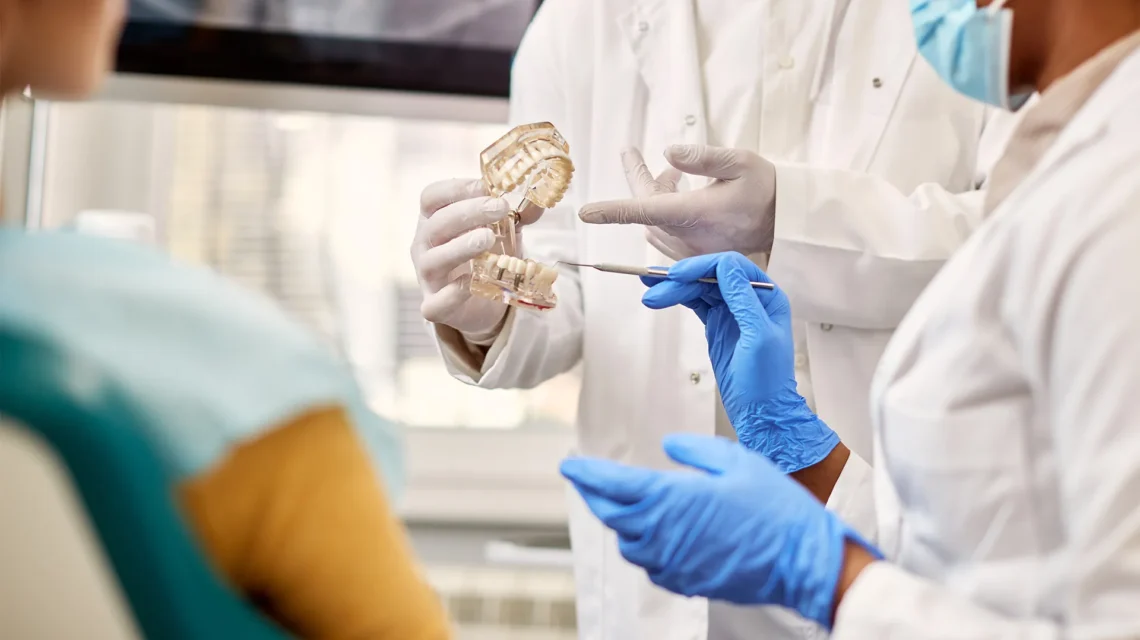The journey to reclaim a confident, healthy, tooth-filled smile, often leads our patients to explore dental implants for the first time, which offer a long-term and durable solution for missing teeth. If you’re new to the idea of dental implants, a common topic that comes up is around the choice of material used – titanium vs. zirconia – and related questions about their properties, differences, and suitability. To help make the decision a little bit easier, let’s discuss the science behind smiles with titanium and zirconium dental implants.
Titanium Dental Implants – A Time-Tested Choice
Titanium dental implants have long been the preferred material for dental implants due to their exceptional strength, durability, bio-compatibility, and non-toxic nature, making them a prime choice for tooth replacement. The science behind titanium in dental implants reveals that the combination of its special properties is what makes it have such high success rates in restoring smiles.
Here are the characteristics that make titanium dental implants a time-tested and advantageous choice:
- Titanium implants have been FDA-approved for over 30 years in the USA and Europe, making them a reliable and well-established option.
- Titanium has remarkable strength and durability, making it capable of withstanding the mechanical forces of biting and chewing, ensuring the long-term stability and functionality of the artificial tooth.
- Titanium dental implants are bio-compatible, characterized by their minimal reactivity with biological tissues. Titanium oxide (Ti02) is the most common form of titanium found in dental implants, particularly favored for applications requiring osseointegration due to its compatibility with bone tissue.
- It also cooperates with imaging techniques like CT and MRI scans as it is non-ferromagnetic, meaning that it reacts very weakly to external magnetic fields compared to other metals. This makes it a valuable material for use in patients who may need detailed imaging for precise treatment planning and post-operative evaluations.
- Dental titanium implants have a fracture rate of less than 1% when correctly placed.
The drawbacks of titanium in dental implants include:
- It’s a metal, which means that there is a higher risk of the implant corroding or the individual being allergic to it. It also contains trace amounts of other metals like nickel, cobalt, and chromium which can cause sensitivity reactions.
- Titanium dental implants have a high “surface free energy” (SFE) which makes them have a lower tendency to interact with water (hydrophobic). This means that the implant is more likely to repel or resist water (not bond with it), which can have negative consequences like a great accumulation of bacteria and biofilm when compared with zirconium dental implants. If the implant attracts and collects dental plaque, it could contribute to gum inflammation and recession.
- Titanium dental implants do have some aesthetic concerns in that they can thin out gum tissue due to their hydrophobic nature mentioned above, but they can also get this gray shadow effect. Their darker hue creates a visible contrast at the gumline, making it obvious that there’s a prosthetic present.
Zirconia Dental Implants – The Ceramic Contender
Zirconia, a ceramic material, presents a newer alternative to titanium in dental implants. Zirconium is hypoallergenic, tooth-colored, and has the potential for soft tissue integration as it is bio-inert – it doesn’t interact with living tissue.
Here are the characteristics that make zirconium dental implants a great contender against titanium dental implants:
- In the aesthetics debate, zirconia vs. titanium, zirconia wins with its white color. It can blend seamlessly with natural teeth, making it a preferred choice for individuals seeking dental implants that closely mimic their original teeth.
- Zirconium in dental implants does not trigger metal allergies, as it’s not a metal. There is a lower risk of adverse reactions and those with metal sensitivities can feel safe choosing this type of dental implant. Because of its ceramic makeup, this also means that the zirconia in the implant has no risk of corrosion.
- Zirconia has a lower “surface free energy” when compared with titanium, making it more stable and bio-compatible with its uniform oxide layer. This means you’re less likely to get an accumulation of bacteria and biofilm on the implant, making it more favorable for those trying to avoid gum inflammation, gum recession, and gum disease.
The drawbacks of zirconium dental implants include:
- Zirconia is more brittle than titanium, which can lead to fractures when subjected to excessive force. This means that precise placement is necessary, and ongoing maintenance is needed to ensure longevity and integrity. This also means that zirconia implants may not be suitable for complex and intricate oral restorations or implant-supported dentures.
- Zirconium dental implants are priced higher than titanium due to their superior aesthetic qualities and unique properties.
- Zirconium dental implants have been FDA-approved for 15+ years in the USA and 20+ years in Europe, which is a much shorter time range than that of titanium dental implants – more research is needed in long-term performance.
Making a Choice Between Zirconia vs. Titanium Dental Implants
When deciding between zirconia vs. titanium dental implants, focus on your specific dental requirements and personal preferences. If aesthetics are a top concern and you desire a natural-looking smile, zirconia implants may be the right option. Conversely, if cost-effectiveness is a priority and you have no known sensitivities to titanium, titanium dental implants could work for you.
Are You Ready to Restore Your Smile?
Take the first step towards regaining your confidence and enhancing your smile by scheduling a consultation with us today.




